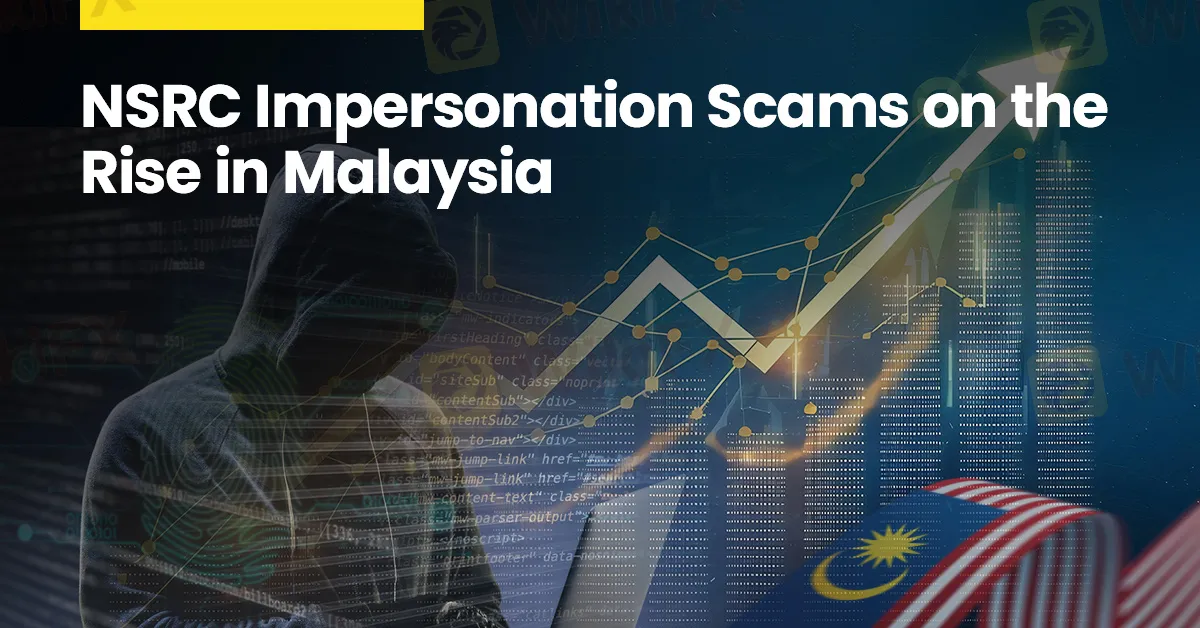简体中文
繁體中文
English
Pусский
日本語
ภาษาไทย
Tiếng Việt
Bahasa Indonesia
Español
हिन्दी
Filippiiniläinen
Français
Deutsch
Português
Türkçe
한국어
العربية
NSRC Impersonation Scams on the Rise in Malaysia
Abstract:The article underscores the imperative for public vigilance against impersonation scams targeting bank customers, emphasizing the heightened risk posed by fraudulent calls from individuals masquerading as National Scam Response Centre officers.

Amidst a surge in scams impersonating National Scam Response Centre (NSRC) officers, the public receives a stern caution from the Association of Banks in Malaysia (ABM) and the Association of Islamic Banking and Financial Institutions Malaysia (AIBIM). These scams, if successful, could lead to significant financial losses for unsuspecting victims.
Typically, the scam begins with victims receiving calls from individuals claiming to be NSRC officers. These callers allege that the victims' identities, including their National Registration Identity Card (NRIC) numbers or mobile numbers, are linked to illegal activities such as money laundering and transactions involving mule accounts.
The fraudulent tactics deployed by these impostors are sophisticated, involving prolonged interrogation techniques that mimic authentic investigations. Through persistent and repeated phone calls, they gain the victims' trust and persuade them to leave their debit/ATM cards at specified locations.

This manoeuvre grants the fraudsters access to victims' online banking accounts, enabling them to execute unauthorized transfers, initiate bill payments, register for online banking services, and even withdraw cash using the victims' cards.
The NSRC operational procedures are clarified in the statement, emphasizing that the centre only receives calls from the public and does not engage in outbound calls to individuals. It advises immediate disconnection if individuals receive calls from alleged NSRC officers.
Furthermore, the public is cautioned to exercise vigilance against fraudsters impersonating representatives from enforcement agencies and regulatory bodies such as Bank Negara Malaysia and the Royal Malaysian Police. These impostors often resort to intimidation and coercion over the phone to extract sensitive information or persuade victims to transfer money.
The statement reiterates that banks will never request sensitive information such as credit/debit card numbers, CVV numbers, online banking credentials, or SMS OTP/TAC numbers from customers.
In a bid to enhance security measures, banks have implemented various initiatives since July 2023. These include substituting SMS OTP with more secure authentication methods, enhancing fraud detection mechanisms, introducing a cooling-off period for new online banking registrations, restricting secure device registrations to one per customer, and establishing a 24/7 complaint channel.
In addition to these measures, the public is advised to adopt good cyber hygiene practices, such as refraining from clicking on links from unfamiliar sources, downloading applications exclusively from official app stores, and abstaining from sharing banking details or engaging with unknown calls or messages. These precautions are essential to safeguard against financial scams and ensure the security of personal information in today's digital landscape.

Disclaimer:
The views in this article only represent the author's personal views, and do not constitute investment advice on this platform. This platform does not guarantee the accuracy, completeness and timeliness of the information in the article, and will not be liable for any loss caused by the use of or reliance on the information in the article.
Read more

Nonfarm Data Lifts Market Sentiment, U.S. Stocks Rebound Strongly
U.S. nonfarm payrolls for May slightly exceeded expectations, stabilizing investor sentiment and easing fears of a hard landing. This upbeat data sent U.S. equities broadly higher, led by tech stocks, with the Dow and S&P 500 posting significant gains. However, behind the optimism lies a fresh round of market debate over the Federal Reserve’s rate path, with uncertainty around inflation and interest rates remaining a key risk ahead.

OctaFX Flagged by Malaysian Authorities
OctaFX has been officially listed on warning lists by both Bank Negara Malaysia (BNM) and the Securities Commission Malaysia (SC). These alerts raise serious concerns about the broker’s status and whether it is legally allowed to operate in Malaysia.

Errante Broker Review
Established in 2020, Errante has rapidly gained recognition in the forex and CFD trading industry. With a commitment to transparency, client protection, and a diverse range of trading services, Errante caters to both novice and experienced traders. This review provides an in-depth look at Errante's offerings, regulatory standing, trading conditions, and more.

IronFX Broker Review 2025: A Comprehensive Analysis of Trustworthiness and Performance
IronFX Review 2025: Explore the broker’s AAAA WikiFX rating, global regulations, and $500,000 trading prize. Is it trustworthy or a scam? Dive into our transparent analysis!
WikiFX Broker
Latest News
SkyLine Guide 2025 Malaysia: 100 Esteemed Judges Successfully Assembled
Vantage Markets Review 2025: Trusted Forex and CFD Trading Since 2009
Why STARTRADER Is Popular Among Traders?
A Guide to Intraday Forex Trading You Can't Miss Out
CONSOB Blocks Access to 13 Unauthorized Investment Websites
TradingPRO: A Closer Look at Its Licences
The world could be facing another ‘China shock,’ but it comes with a silver-lining
New SEBI Regulations on Intraday Trading
Everything You need to know about Barath Trade
IronFX Broker Review 2025: A Comprehensive Analysis of Trustworthiness and Performance
Currency Calculator


